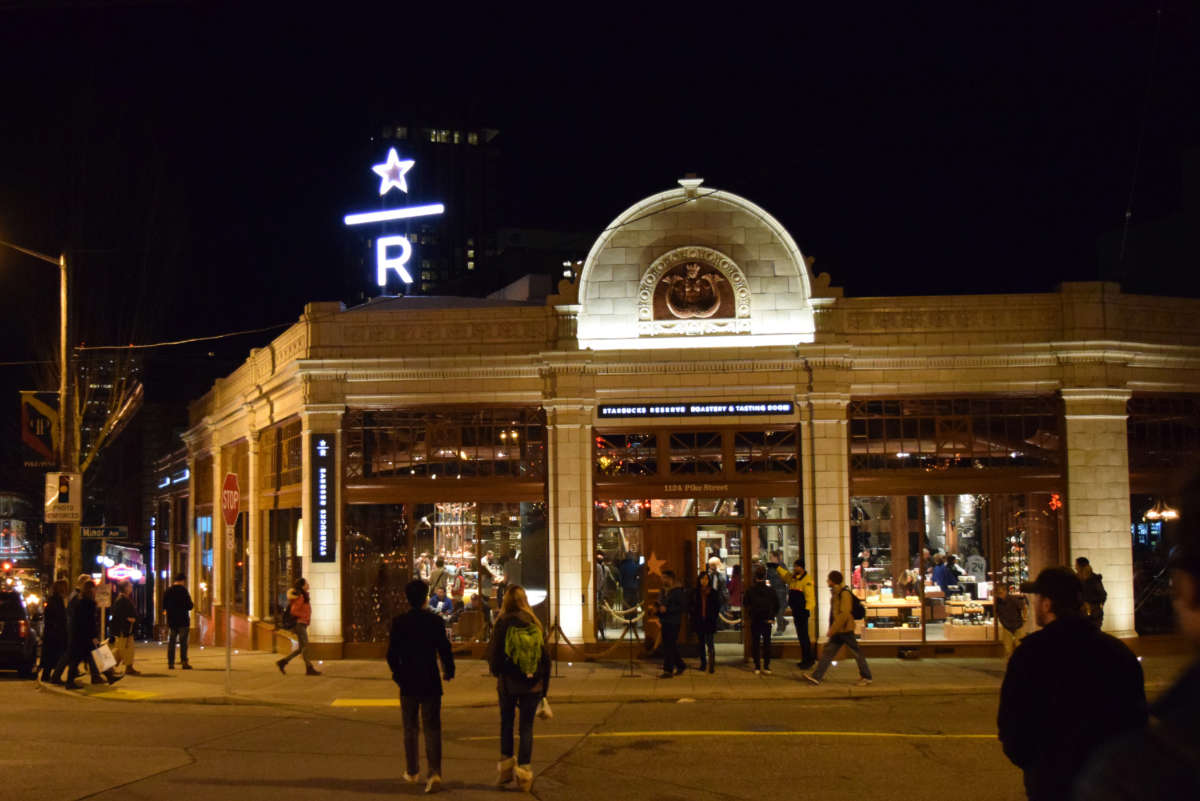Starbucks workers at a flagship roastery in the company’s hometown of Seattle voted to form a union with Starbucks Workers United on Thursday, joining 25 other Starbucks stores that are currently unionized.
The roastery, which the union says is only 2.5 miles as the crow flies from the company’s corporate headquarters in downtown Seattle, is one of three flagship locations in the country. Workers voted 38 to 27 in favor of the union. The Seattle location is the second roastery to unionize; workers at the New York City roastery voted to form a union earlier this month.
“This vote signals something that the Roastery organizers always knew to be true. That the bonds we share between workers are our greatest strength,” Seattle roastery employee Brennen Collins said in a statement. “We can resist and thrive, even among a storm of disinformation and fear-mongering perpetrated against our best interests.”
Starbucks roasteries offer specialty drinks, food and merchandise to customers and also roast and ship coffee to regular stores. The company describes the roasteries as being like “If Willy Wonka had built the ultimate coffee shop,” and the locations are especially important to CEO Howard Schultz.
“This Roastery is the fulfillment of a decades-long dream,” Schultz said when the Seattle roastery opened in 2014. “Everything we’ve ever done has led us to this point. This is the moment of the next generation of Starbucks.”
The union has filed petitions in over 200 stores so far, covering more than 5,000 employees. More filings come in daily, and the number of unionized stores is rapidly increasing.
The location is the second Starbucks store in the company’s hometown to unionize; last month, workers at the Broadway and Denny location voted unanimously to form a union. The location is just 10 minutes away by car from Starbucks’s corporate headquarters, and workers say they often see corporate employees come in and offer their support for the union drive.
While workers have offered their support, however, management has been less than friendly toward the union and the worker-organizers.
“Union-busting has become synonymous with Starbucks,” the union wrote in a statement. “Partners from stores that petition to join Workers United are prepared for the deluge of union-busting tactics that the company employs, including holding captive audience meetings, threatening loss of benefits, and spreading of misleading information to sow fear and confusion. The Seattle Roastery was no different.”
The union noted that it has filed nearly 80 charges against Starbucks so far, alleging that the company has illegally interfered with the union drive and that it has retaliated against pro-union workers. The National Labor Relations Board (NLRB) has found that the company has indeed violated federal labor laws on multiple of these charges so far.
Though workers have protested against Starbucks’s union-busting tactics, Schultz is still dissatisfied with the results of the company’s anti-union campaign. In a leaked video with management from last week, as obtained by More Perfect Union, Schultz said that the pro-union workers are “some outside force” that is “trying desperately to disrupt our company.”
“It’s an American right of workers not to unionize and to [instead] embrace the values and the culture of his or her company,” Schultz said in the hour-long conference. He said that it’s time for managers to step up their anti-union practices to make workers “understand what it would really mean to vote for a union.”
The company recently filed its first unfair labor practice complaint against the union, painting pro-union workers as extremely aggressive and claiming that they made threats to bully other workers into supporting the union. Workers say that these allegations are patently untrue; worker-organizer Brian Murray wrote that the allegations are a “gross misrepresentation at best” of what he’s seen from pro-union workers, and that the company is only “doubling down on lies and threats” as more stores win their unions.
Press freedom is under attack
As Trump cracks down on political speech, independent media is increasingly necessary.
Truthout produces reporting you won’t see in the mainstream: journalism from the frontlines of global conflict, interviews with grassroots movement leaders, high-quality legal analysis and more.
Our work is possible thanks to reader support. Help Truthout catalyze change and social justice — make a tax-deductible monthly or one-time donation today.
